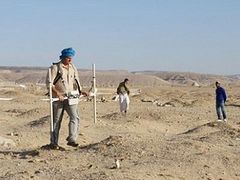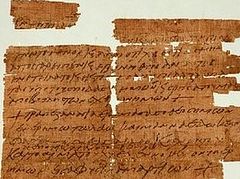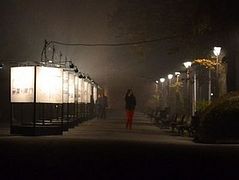Source: Cogniarchae
November 2, 2015
Wait!!!
Before you start throwing rocks at me I have to tell you that this is not my idea – it comes from a famous medieval text – “the chronicle of Dalimil”! Still, chances are that you never heard of this text and for me this is a good enough reason to make a post about it.
So what is this “Chronicle of Dalimil” you ask now? Well, it is a very important document for Czech people, because it is the first known text written in Czech language, somewhere in the first quarter of the XIV century. The text was also translated in German and had many re-editions in this part of the world due to it’s enormous popularity.
In brief, this text provides us with chronological history of the Slavs, starting with the most ancient of times and finishing with the important events of the XIV century. The author unfortunately does not provide us with sources for it’s claims, which was a normal practice at the time, but it is assumed that some of his ideas are based on the older chronicles written in Latin, not preserved today, as well as on some oral tradition of the Slavic tribes.
So, to cut long story short, what is so striking about this text is that at it’s very beginning, right after the introduction, the author connects origin of Slavs with the construction of tower of Babel! BUT as if this is not enough of a shocker, he does not use the word “Slavs” at all, but the word “Serbs” instead! Did ethnonym “Slav” exist in the XIV century? Yes, in the 6th century AD Procopius mentions Slavs in Byzantine Greek, and he refers to them asΣκλάβοι Sklaboi. The first mention in Old Church Slavonic is from the 9th century and reads: Slověne. So why “Serbs” and not “Slavs”? It is a mystery, but this text states that after the God’s punishment those Serbs who lived in Babylon moved to the Mediterranean region.
“Mezi jinými
Srbové,
(Amongst
other Serbs,)
тu kdežto bydlí
Rekové, (where
Greeks dwell,)
podle more se usadili,
(near the sea settled,)
až do Ríma se
rozminožili.”
(and to Rome they spread.)
Chronicle of Dalimil (Chapter 1, lines 29-32)
Immediately after these lines the origin of Slavic tribes is explained in the following manner:
V srbském jazyku jest
země, (In Serbian language
there is a country,)
jiež Charvátci jest
jmě.
(named Croatia,)
V tej zemi bieše
lech,
(in whom there was a Pole,)
jemuž jmě bieše
Čech.
(named Czech.)
Chronicle of Dalimil (Chapter 2, lines 1-4)
So this just gets more and more enigmatic as we see. Is the author trying to make a chronology of Slavic tribes here? He is stating that Czech was a Polish man, who came from Croatia, that was a Serbian country? We don’t know what he meant by that. True, there was another white-Croatia and another white-Serbia in the general area of Bohemia, of what is now Poland, so does he speak of the Balkan countries or these ones?
Opinions on this vary. My opinion is that he speaks of the Balkan countries and I say this for the two reasons:
1. This text comes immediately after the passage where he connects Serbs with the Mediterranean
2. In the continuation of the text he states that Czech needed to leave Croatia after he had killed a man, so he settled in the new country. (some other chronicles also mention this event). If he really wanted to run away, it would not make much sense to just move to another village I guess.
So, are there any other known sources connecting origin of Slavs to Balkan? Yes! Probably the most famous of all medieval Slavic texts, “Nestor’s chronicle” is written in the first quarter of XII century, some 200 years before the chronicle of Dalimil. Nestor states that the origin of all Slavs is on Balkans, from where they were pushed away by Roman armies (?). Here is the whole passage:
Over a long period the Slavs settled beside the Danube, where the Hungarian and Bulgarian lands now lie. From among these Slavs, parties scattered throughout the country and were known by appropriate names, according to the places where they settled. Thus some came and settled by the river Morava, and were named Moravians, while others were called Czechs. Among these same Slavs are included the White Croats, the Serbs and the Carinthians. For when the Vlakhs (*Romans) attacked the Danubian Slavs, settled among them and did them violence, the latter came and made their homes by the Vistula, and were then called Lyakhs. Of these same Lyakhs some were called Polyanians, some Lutichians, some Mazovians, and still others Pomorians. Certain Slavs settled also on the Dnieper, and were likewise called Polyanians. Still others were named Derevlians, because they lived in the forests. Some also lived between the ‘Pripet’ and the Dvina, and were known as Dregovichians. Other tribes resided along the Dvina and were called the Polotians on account of a small stream called the Polota, which flows into the Dvina. It was from this same stream that they were named the Polotians. The Slavs also dwelt about Lake Il’men, and were known there by their characteristic name. They built a city which they called Novgorod. Still others had their homes along the Desna, the Sem’ and the Sula, and were called Severians. Thus the Slavic race was divided, and its language was known as Slavic.
So there you go, I am not bringing any claims here, but I think that it is really interesting and important to know that in middle ages it was a wide-spread belief that Slavs originated from the Balkans and that Serbs were one of the their oldest tribes.






In any case drink a slibovic and calm down brate
But, what ever the case may be, one should also consider the fact that, the Serbs, cannot be descendants of the Lusatian Serbs who call themselves "sorbi" because the very name linguistically speaking cannot contain an o because if you take the word "Srbin" as an example, which is the Serbian word for "a serb", if you were to transliterate it so that you have an identical pronunciation, you would get "Serb", same goes for "Srbija" which is the Serbian word for Serbia", as some might know, Slavic languages by default tend to be a cluster of consonants as evident in Slovak and Czech and also Southern Slavic languages such as Serbian.
Please understand that by writing this i am not being desperate as to try to prove that the Serbs never came from that region, i am only trying to point out something that i find illogical and there are many illogical aspects of the theory that the Serbs moved from "White Serbia" and to the Balkans, i think the theory is skewed against the Serbs, they are considered "invaders" but the Hungarians who, according to the same logics, should also be seen as such but SOMEHOW are not considered as such .... i mean, what gives?